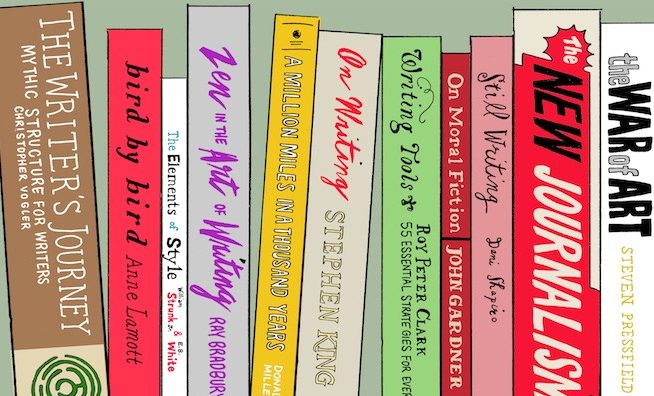While deep in the dissertation process, it can be very helpful to have “friendly” books nearby that help ignite awareness of “writer within.” While some dissertation writers feel they need to quarantine themselves from any other lived experience, the reality is that reading for pleasure can profoundly mitigate the oppressive rigor by offering a respite in the shared experience. The easy reading of anecdotes and other personal experiences shared by another writer subliminally influences the reader (a writer) to empathize and realize a shared community. This is all very valuable psychological experience for the writer.
Whenever I’m deep in writing a longer piece, I find it helpful to have books and authors who offer very readable prose and weave stories revealing their strategies of overcoming the odds. The authors are be better known as novelists and/or creative non-fiction writers, and so their prose and writing styles captivate my attention.
As writing is a creative enterprise, these writers and their stories help remind me to slow down, to discover, to allow new ideas to arise. I’m avoiding the writing primers or those rhetorics that tell me the rules around writing a certain genre. They’re certainly valuable and have a place, but not now. At this moment, I need encouragement and to be creatively stimulated, and I get that by being immersed in sharing another person’s narrative of their writing experience.
These authors generously share their critical self-reflections on their personal writing process and what they’ve learned from others. They might touch upon the spiritual connection to writing and how they’ve grown as a writer. Many times, there are references to published pieces that I recall reading, and getting to know about the writer’s process engages me in a meta-understanding about writers. The authors might also share some wisdoms as well as practical advice. Above all, their narratives inspire me to write.
Here’s my list of those books that line a nearby shelf. These are the books that I take down to help me stay in the creative process, and you might be surprised that several have been around for a few decades. I don’t tire of their voices and often find a new appreciation. These writers are engaging and generous with advice while honestly sharing their own challenges. Above all, they are authentic, and they will always have a place in my home.
Annie Dillard – The Writing Life
This is the first book I bought about the artistic craft & discovery potential involved in writing. The descriptive passages are written with an astute eye on the rigor of the craft in a friendly, very readable style.
Peter Elbow – Writing with Power
The best book out there to move you from overthinking about the finished product. Elbow provides some helpful exercises to help stimulate the unconscious mind to play with writing and to silence the critical eye.
Natalie Goldberg – Writing Down to the Bones: Freeing the Writer Within
Goldberg helps free the “writer within” with playful and mind-freeing exercises as well as solid, practical advice about the writing process.
Stephen King – On Writing: A Memoir of the Craft
Here’s King’s testimony about his life as a writer and how writing ultimately helped him recover from his near fatal accident. King writes a fast-moving, witty personal narrative about writing while offering a few successful practices.
Anne Lamott – Bird by Bird: Some Instructions on Writing & Life
Can we extricate writing from life? Not possible according to Lamott who writes a delicious read of personal stories interweaving life’s travails and the art of writing. The “writer within” can’t be separated from the craft.
John McPhee – Draft No.4: On the Writing Process
If you’ve read McPhee before, the book is classic McPhee: a quick moving narrative with rich tapestry of personal experiences and insights about his writing process. I admire how McPhee can take a remote subject – let’s say the Pine Barrens of NJ – and craft a very readable, entertaining read. And this recently published book did not disappoint.
Eudora Welty – One Writer’s Beginnings
Here’s an autobiography of a favorite writer who shares life stories while reminding us to pay attention, to notice, to listen. It’s a gorgeous read.
William Zinsser – On Writing Well
This was required reading for English majors back in the mid-1970s when I was an undergraduate, and I still refer to it. Of course, it’s had multiple printings and editions since then, but it’s still a classic text that blends Zinsser’s experiences as a writer and teacher of writers with clear guidance on writing non-fiction.


